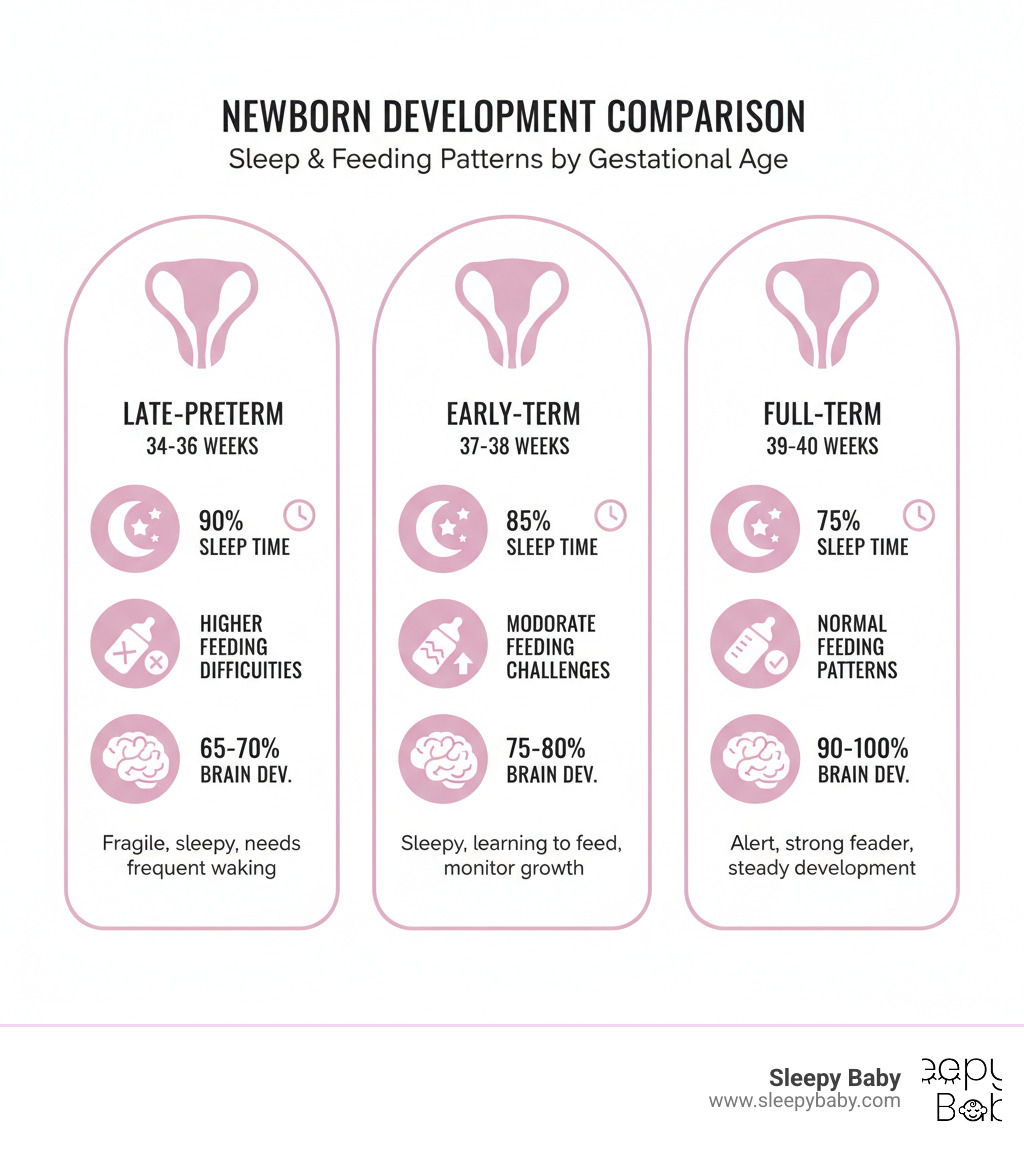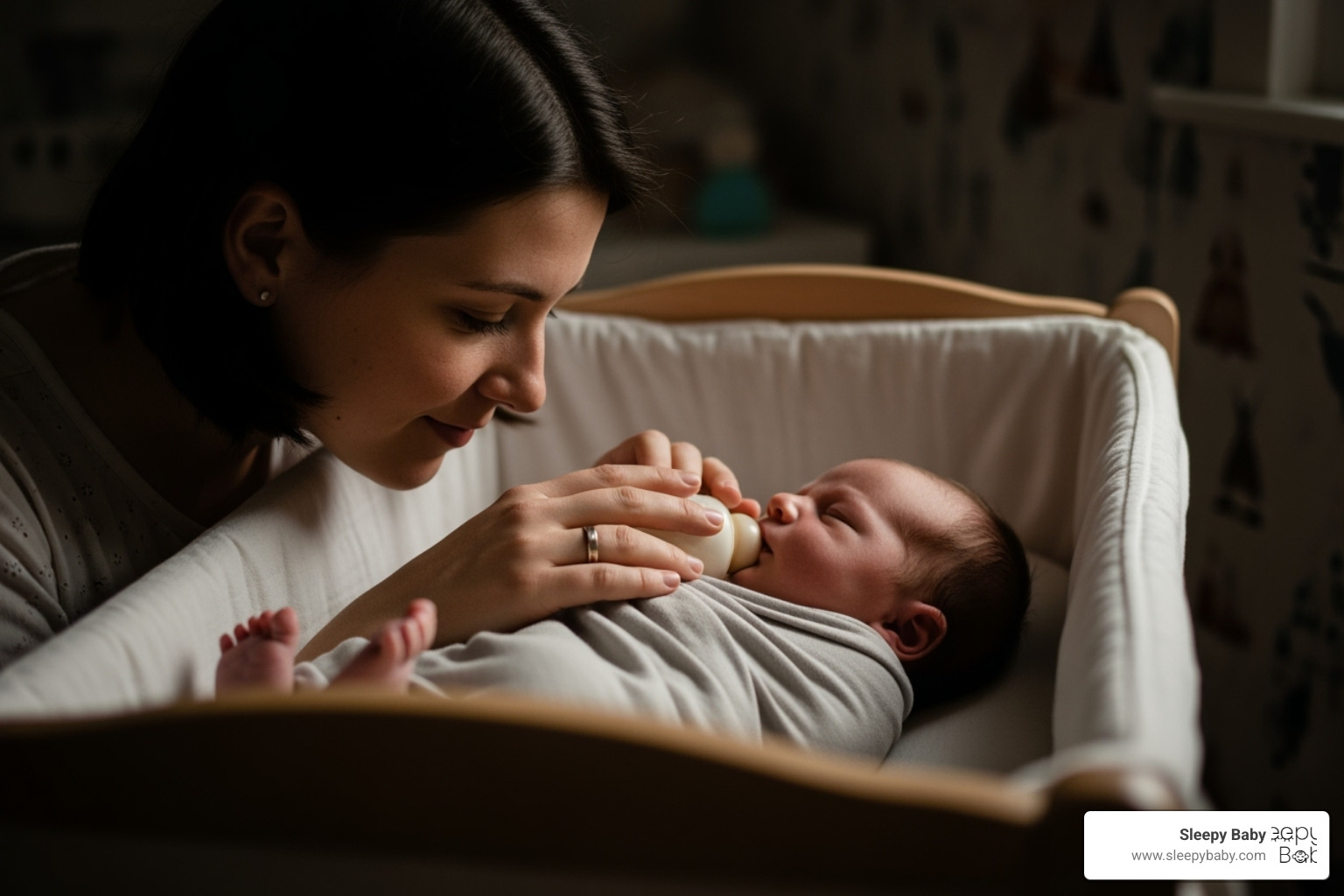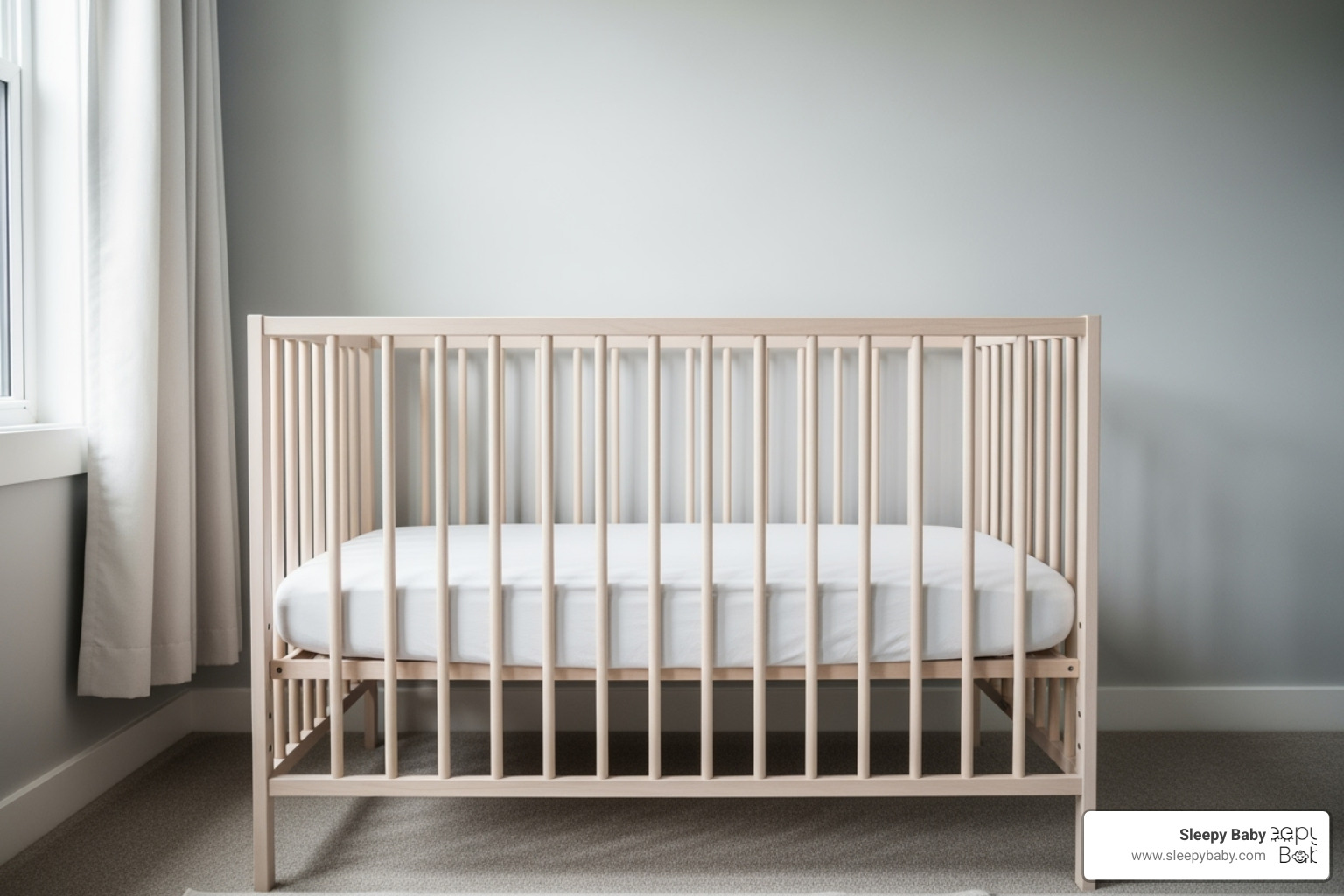Why Early-Term Babies Often Sleep More (And What Parents Should Know)
Are babies born at 37 weeks more sleepy than their full-term counterparts? The simple answer is yes, especially in their first few weeks. Babies born at 37 weeks, considered "early-term," are typically sleepier due to brain immaturity and the need to conserve energy.
While they may sleep up to 90% of the day, this sleep is often less efficient than that of a full-term baby. This excessive sleepiness can interfere with feeding, potentially increasing the risk for jaundice. Because of this, parents must wake them every 2-3 hours to ensure they get adequate nutrition.
Your 37-week baby may look like any other newborn, but their brain is only about 75-80% as developed as a full-term baby's. This difference means they need more sleep to finish the growth that would have happened in the womb. Research also shows that children born at 37-38 weeks may experience shorter sleep duration and more sleep disorders later in childhood compared to their full-term peers.
As Gary Harutyunyan, founder of Sleepy Baby, I understand how concerning it can be when are babies born at 37 weeks more sleepy becomes a daily worry. My experience developing sleep solutions has shown me that understanding these early developmental differences is crucial for establishing healthy sleep patterns from the start.

Understanding the "Sleepy" Early-Term Newborn
When you welcome your little one at 37 weeks, you might notice they seem to sleep constantly. While this might seem like a blessing, there's more going on beneath the surface. Are babies born at 37 weeks more sleepy? Absolutely, and there's a clear biological reason why.
Early-term babies (born between 37-38 weeks) are working overtime to complete development that normally happens in the final weeks of pregnancy. This newborn sleepiness is a form of energy conservation. Their bodies are focusing all available energy on critical tasks like brain growth. However, this can create challenges. When babies sleep too much, they may miss important feeding cues, leading to dehydration and an increased risk of jaundice.
This is why pediatricians often recommend that parents act as gentle alarm clocks, waking their sleepy baby to feed every 2-3 hours, even if it feels wrong to disturb their slumber.
Why do 37-week babies seem so sleepy?
The main reason for this sleepiness is brain development. At 37 weeks, a baby's brain is only about 75-80% developed compared to a full-term infant's. The remaining maturation needs to happen outside the womb, and sleep is when much of this work occurs.
Beyond the brain, early-term babies are dealing with immature organ systems. Their bodies are still learning to regulate temperature, breathe efficiently, and maintain their metabolism. Their sucking reflex and overall stamina are also less developed. They might start feeding with enthusiasm but tire quickly because their muscles lack the strength built in the final weeks of gestation.
Early-term babies also conserve calories more aggressively. With less body fat, every calorie is precious. Sleep becomes their method of stretching energy reserves while supporting critical growth. For more detailed guidance, information on late preterm baby care provides comprehensive insights into caring for babies born before 39 weeks.
The Connection Between Sleepiness, Feeding, and Jaundice
Excessive sleepiness, feeding difficulties, and jaundice often create a concerning cycle. When babies are too sleepy, they miss feedings. Poor feeding means less milk, which can lead to dehydration and fewer bowel movements—the primary way babies eliminate bilirubin from their systems.
Jaundice occurs when bilirubin builds up, causing a yellowish tint to the skin and eyes. Early-term babies are at a higher risk because their livers are less mature at processing bilirubin, and their sleepiness interferes with the frequent feeding needed to flush it out.
The problem is that jaundice itself can make babies even more lethargic. A jaundiced baby shows fewer feeding cues and becomes harder to wake. This creates a cycle: sleepiness leads to poor feeding, which worsens jaundice, which in turn increases sleepiness.
This is why healthcare providers emphasize frequent feedings (8-12 times in 24 hours), even if it means waking a sleeping baby. Those feeds are essential for preventing complications.

So, Are Babies Born at 37 Weeks More Sleepy? A Closer Look at Sleep Patterns
The short answer to are babies born at 37 weeks more sleepy is yes, but it's more complex than just counting hours. While a 37-week baby might spend more time asleep, the quality and organization of that sleep tell a different story.
Gestational age at birth significantly shapes a baby's sleep architecture. It's not just about how long they sleep, but how well they sleep. Recent scientific research on gestational age and sleep reveals how birth timing affects sleep patterns, both immediately and years later.
Early-term babies sleep more initially because their bodies are catching up on development. But this extra sleep comes with trade-offs. For more insights, check out our guide on preemie sleep patterns.
Specific Sleep Characteristics: Are babies born at 37 weeks more sleepy?
Babies born at 37 weeks are indeed more sleepy in their first weeks, sleeping up to 90% of the day compared to 75% for full-term babies. However, this initial sleepiness doesn't equate to better sleep quality.
They sleep more because their systems are working harder to develop and regulate basic functions like breathing and temperature. A large national study revealed that compared to full-term children, those born at 37-38 weeks showed significantly higher sleep problem scores on standardized questionnaires. They also had shorter daily sleep hours and a higher likelihood of developing pediatric sleep disorders as they grew.
This creates a paradox: while they start as the sleepiest babies, they may struggle more with sleep quality and duration later in childhood. Their initial extra sleep might be a way of compensating for less efficient, more fragmented rest.
| Characteristic | Late Preterm (34-36 weeks) | Early Term (37-38 weeks) | Full Term (39-40 weeks) |
|---|---|---|---|
| Total Sleep Time | Up to 90% of the day (18-22 hours) | Around 85% of the day (17-20 hours) | Around 75% of the day (16-18 hours) |
| Sleep Cycle Length | Shorter, more disorganized cycles (30-45 mins) | Shorter, less organized cycles (40-50 mins) | More regular cycles (45-60 mins) |
| Sleep Quality | More active sleep, less quiet sleep | Increased active sleep, still maturing | More balanced active/quiet sleep |
| Waking for Feeds | Very sleepy, often needs waking every 2-3 hrs | Sleepy, often needs waking every 2-3 hrs | Wakes more readily, typically every 3-4 hrs |
| Common Challenges | Feeding difficulties, temperature instability, jaundice, apnea, disorganized sleep | Feeding difficulties, jaundice, temperature regulation, increased SIDS risk, disorganized sleep | Establish day/night, occasional feeding issues |
| CSHQ Score | Significantly higher than full-term | Significantly higher than full-term | Reference baseline |
| Long-Term Sleep | Higher risk of sleep problems in childhood | Higher risk of sleep problems in childhood | Lower risk of sleep problems in childhood |
How Sleep Cycles Differ: Active vs. Quiet Sleep
Understanding your baby's sleep cycles helps explain why babies born at 37 weeks are more sleepy yet can seem restless. Newborn sleep is divided into two main states.
Active sleep is crucial for brain development. You'll notice your baby's eyes moving under their lids, irregular breathing, and small twitches or smiles. This twitching helps the brain coordinate body movements. Early-term babies spend more time in this state as their brains work to catch up.
Quiet sleep is deep, peaceful rest. Breathing is regular, and their body is still. This is when physical growth and recovery are most efficient. As babies mature, they spend more time in quiet sleep.
The challenge for 37-week babies is their immature sleep cycles. They have shorter, more fragmented cycles and spend proportionally more time in active sleep. This means that while they appear to sleep constantly, much of that sleep is lighter and less restorative. Their neurological systems are still developing the ability to organize sleep efficiently, a process that is normally fine-tuned during the final weeks of pregnancy.
For a deeper understanding of these patterns, our guide "Sleep Like a Baby: Decoding Infant Sleep Habits" offers practical insights.

Developmental & Health Considerations for Your 37-Weeker
When parents ask are babies born at 37 weeks more sleepy, the concern often goes beyond just sleep. The extra sleepy hours reflect a deeper process: their bodies are working hard to complete development that would have finished in the womb. The final weeks of pregnancy are critical for maturing all organ systems, especially the brain.
Sleep becomes their secret weapon for catching up. During slumber, their brains build neural networks and organize systems essential for cognitive development, motor skills, and self-regulation. It's not just rest—it's active construction work happening inside their heads, which is especially important for early-term infants.
Potential Risks Associated with Early-Term Sleep
While extra sleep is purposeful, it can also signal unique challenges for a 37-weeker. These babies face a combination of developmental factors that make sleep both more necessary and more complicated.
- Temperature regulation is a major concern. Early-term babies have less body fat, so they burn precious calories just to stay warm. This makes them even sleepier and leaves less energy for feeding. Skin-to-skin contact is valuable as it helps them maintain body temperature without draining their energy.
- Breathing problems can disrupt sleep. Immature lungs increase the risk of respiratory distress or apnea (pauses in breathing). These issues can fragment sleep and require careful monitoring.
- The risk of SIDS is higher in babies born at 37 weeks compared to full-term infants. This is partly due to weaker respiratory muscles and less developed arousal responses during sleep. Following safe sleep practices is therefore even more critical. The NHS provides excellent guidance on safe sleep that is vital for early-term infants.
- Feeding difficulties and less mature immune systems create further challenges, as sleepiness can hinder feeding and their vulnerability to infections can disrupt sleep patterns.
Long-Term Developmental Effects
The effects of being born at 37 weeks can extend into childhood. Those higher sleep problem scores mentioned earlier represent real challenges families may face years later.
Childhood sleep problems are more likely, which can impact other areas of development. Children with persistent sleep issues often struggle with behavioral regulation, showing more irritability or difficulty managing emotions. Cognitive function can also be affected, as quality sleep is essential for memory consolidation and learning.
Even social skills can be impacted, as sleep-deprived children may have a harder time with social cues and emotional regulation. The good news is that understanding these potential challenges allows you to be proactive. Many early-term babies thrive with appropriate care and attention to their sleep needs from the start.
Our guide on "The Sleep Journey: Infant Sleep Patterns in the First Year" walks you through how these patterns evolve.
Strategies for Promoting Safe and Healthy Sleep
Creating the right sleep environment for your 37-week baby requires a balance of safety, comfort, and understanding their unique needs. Since are babies born at 37 weeks more sleepy but also face more risks, your strategies can make a significant difference in their development and your peace of mind. With a few key adjustments, you can help your early-term baby get the restorative sleep they need while keeping them safe.
Creating a Soothing and Safe Environment
For early-term babies, who are at a higher risk for complications like SIDS, following safe sleep guidelines is essential. But safety doesn't mean sacrificing comfort.

The foundation is a firm, flat surface where your baby always sleeps on their back. This "back to sleep" position is crucial. Your crib or bassinet should have only a fitted sheet—no loose bedding, blankets, pillows, or stuffed animals that pose a suffocation risk.
To keep your baby warm, dress them in a sleep sack or swaddle (until they show signs of rolling), using one more layer than you're comfortable wearing. This keeps them cozy without the risks of loose blankets.
Keep the room temperature between 68-72°F (20-22°C). This helps your early-term baby's body focus energy on growth rather than on staying warm. A calm, dimly lit space also minimizes overstimulation, supporting their neurological development.
For more guidance, our article on establishing newborn sleep patterns walks you through creating effective routines.
Using Modern Sleep Aids Safely
When you're waking a baby every 2-3 hours for feeding, modern sleep aids can be a lifesaver—if used correctly. The key is choosing products designed with safety as the top priority.
White noise can be very helpful. While some older devices produce sound at unsafe levels, modern safety-rated devices present white noise at safe, low-decibel levels. For best practice, place these devices at least 7 feet from your baby. Some innovative products can even be positioned closer—sometimes on the baby's chest—while staying within safe sound limits. This consistent sound mimics the womb and masks household noises that might startle them.
Rhythmic tapping devices offer unique comfort for early-term babies who miss the constant motion of the womb. These devices mimic a caregiver's comforting touch, providing gentle, consistent sensations that help babies feel secure. For exhausted parents, this hands-free solution offers peace of mind while supporting a baby's need for soothing.
Modern sleep aids often have customizable settings, allowing you to adjust sound, tapping intensity, and duration to match your baby's needs as they mature. When integrated into a consistent bedtime routine, these tools can help your early-term baby transition to sleep more smoothly.
If you're exploring options, our guide "Dreamland Awaits: Best Sleep Aids for Your Newborn" breaks down what you need to know.
Frequently Asked Questions about Early-Term Baby Sleep
As parents steer the challenges of caring for a 37-week baby, certain questions arise frequently. Here are the most common concerns about early-term baby sleep.
How much should a 37-week newborn sleep?
Are babies born at 37 weeks more sleepy? Yes. They may sleep up to 22 hours a day, but this sleep comes in short, disorganized bursts. The key is ensuring they wake every 2-3 hours for feeding, as their sleepiness can cause them to miss essential nutrition. Their immature systems require this extensive rest for development, but their small energy reserves make consistent feeding non-negotiable.
When should I worry about my 37-week baby's sleepiness?
While sleepiness is expected, there's a line between normal drowsiness and concerning lethargy. Contact your pediatrician if your baby is too sleepy to wake for feedings, even with gentle stimulation. Other red flags include refusing to eat, showing signs of dehydration (fewer wet diapers, dry mouth), or developing a worsening yellowish tint to their skin (jaundice). Also, watch for babies who seem unusually lethargic and floppy or show any signs of breathing difficulty. Trust your instincts; it's always best to seek professional guidance if you're concerned.
Do babies born at 37 weeks have more sleep problems later on?
Research suggests that children born "early-term" (37-38 weeks) may have a higher risk of sleep problems in childhood, such as shorter sleep duration and more night wakings, compared to full-term babies. Studies show these children often score higher on sleep problem questionnaires years later. This highlights the importance of establishing healthy sleep habits early and being vigilant about sleep quality as they grow. With the right support, many early-term babies become excellent sleepers.
Conclusion
So, are babies born at 37 weeks more sleepy? Yes, they are. This initial sleepiness, which can last for up to 22 hours a day, is their body's way of working overtime to complete the crucial development that normally happens in the womb. However, this sleepiness can mask serious challenges.
Parents must understand that this sleepy state can lead to missed feedings, dehydration, and jaundice. This is why healthcare providers stress the importance of waking these babies every 2-3 hours to feed. The sleep story also continues into childhood, as research shows early-term babies may face more sleep challenges later on, emphasizing the need to build healthy habits from the start.
Vigilance is key. Watch for signs that your baby is too sleepy to feed, dehydrated, or developing jaundice. If something feels off, contact your pediatrician. The good news is that with proper care, most early-term babies thrive.
Creating a safe sleep environment is the foundation. Modern sleep aids can offer additional support. Rhythmic tapping devices that mimic a parent's touch and safely designed white noise machines can provide comfort and help soothe your baby. At Sleepy Baby, we understand these challenges. Our intelligent sleep solutions are designed to provide that hands-free, customizable soothing that helps both baby and parents get much-needed rest.
While your early-term baby's sleep journey may be different, with the right knowledge and tools, you can help them develop healthy sleep patterns for years to come.
Explore our blog for more expert sleep tips and find how Sleepy Baby can help bring peaceful nights to your home.



